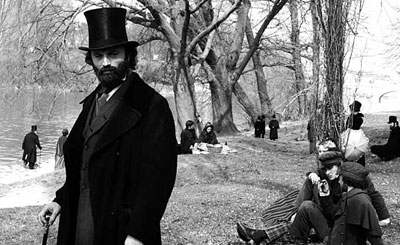A hard, dry, flawless
film
Three guys from the southern Italy, after the ferocious Bourbon repression of the uprisings in 1828, reached the decision to join the Giovine Italia, of Giuseppe Mazzini. Through four episodes that correspond to as many dark pages of the Risorgimento process for the Unification of Italy, the lives of Angelo, Domenico and Salvatore will be marked by their tragic mission of conspirators and revolutionaries, as they will be suspended between moral rigor and killer instinct, spirit of sacrifice and fear, imprisonment and hiding, soaring ideals and political disillusionment. This is a brief synopsis of the last films of Mario Martone "Noi Credevamo - We believed". Domenico, Angelo and Salvatore - says the director - embody very different ways of experiencing secrecy, conspiracy and armed struggle, ways that you can still catch around us, if we do not simply flatten as the huge problems the independence of the peoples on a framework surface. Their story has as background the tormented birth of the Italian state, the choices of a country forever divided into two (at the time between monarchists and republicans, but I would say between democrats and reactionaries, between northerners and southerners ..) the contrast between action and tearing disillusionment that marks since then, like a bitter pendulum, every phase of our history. Looking at the roots of the Italian nation can be seen a lot of the plant that they have developed. Today more than ever the fault of those conflicts and inability to solve them weigh on our recent history.
 |
A frame of the film |
Martone's film is one of the best films of the season. A film severe, dry, formally unexceptionable that raises many novel ideas. How did the desire for independence started and developed in Italy? What were the reasons for the repeated defeats of the revolutionary movement? What brought about the advent of the monarchy when a lot of revolutionary thought in those years was Republican and often revolutionary (of equal merit, agrarian reform, peasant struggles, dignity of women to name a few ..) In the film answers these questions in an indirect but always with intelligence and clarity. Through the lives of three protagonists, the history of Italy pre unit is illustrated and well explained. There's more in the film. A thin thread that holds together the whole movie and that represents us well. Something deep and rooted in the DNA of this nation. The betrayal. We are traitors and ocelots, and transformation traitors, traitors and turnaround. Our revival is crossed by betrayals of all kinds. Expectations of many young people who believed in a free and democratic nation, political choices (the monarchy triumphed over the republic) to the individual behaviors that marked a tragic lives of many fighters for the unity of Italy.
In these months of celebrations for the 150th anniversary of the unification (what there is to celebrate later in a country in disarray and so devoted to the separation of local, regional and ..) Martone's film falls like a boulder on our consciences and makes us questions that you can not subtract. The film, in this case, as a true national consciousness as a tool for reflection and analysis of history. Of our history. Of our present.

